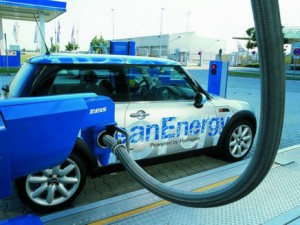 President George Bush passed a $1.2 billion plan for research and development of the hydrogen car. He believed that this was the future of private transport in the United States as it was a pollution free alternative to the combustion engine. Little do people know, President Obama actually killed this plan in 2009 which is contrary to his known position to increase investments in alternative energies. The rationale behind this decision according Energy Secretary Steven Chu is that it will not be practical over the next 10 to 20 years. Electric vehicles were thought to be a better investment for federal monies.
President George Bush passed a $1.2 billion plan for research and development of the hydrogen car. He believed that this was the future of private transport in the United States as it was a pollution free alternative to the combustion engine. Little do people know, President Obama actually killed this plan in 2009 which is contrary to his known position to increase investments in alternative energies. The rationale behind this decision according Energy Secretary Steven Chu is that it will not be practical over the next 10 to 20 years. Electric vehicles were thought to be a better investment for federal monies.
There are too many hurdles to overcome for hydrogen cars; we lack the current infrastructure for it (fuel stations and pipelines), hydrogen is not as efficient as petroleum, it is expensive (because of the expensive platinum components in the battery), and it is not quite pollution-free (some hydrogen is produced by the refinement of fossil fuels) . These prohibitive reasons are why President Obama rejected a further continuance on research for hydrogen vehicles.
However, I believe that we can solve these problems if the federal government had continued funding the hydrogen program. There are other methods of producing hydrogen through wind, solar, and nuclear. If enough money is granted we can figure out alternative battery components that are cheaper and easily produced. Infrastructure can be built by building in targeted regions such as Hawaii where driving patterns are predictable or Los Angeles where there is a large population to be served. GM and the U.S. Army launched a test fleet of 16 hydrogen fuel-cell cars in Hawaii earlier this year.
Furthermore, hydrogen vehicles are better than electric vehicles with respect to the driving range and energy required. Hydrogen fuel-cell vehicles can be refueled in as few as three minutes, then travel for 250 or 300 miles straight. Electrified cars, on the other hand, require about eight hours for complete recharging. Depending on the vehicle, they can go only 40 to 100 miles on pure battery. The electrified vehicle is not completely pollution free because conventional electric generation that is required still pollutes. There has to be a complete overhaul in the energy industry for electric vehicles to not have a footprint on the Earth.
I would like to see the day where I can drive my personal vehicle without contributing to poorer air quality and pollution. If the hydrogen car is successful and people are confident in the technology and purchase these vehicles it will revolutionize the energy and automobile industry. However, it will not solve the congestion problem in urban areas, but it will make the air much cleaner.
http://www.nytimes.com/2009/05/08/science/earth/08energy.html
http://voices.yahoo.com/the-hydrogen-car-george-bush-doesnt-want-you-364518.html?cat=27
http://www.slate.com/articles/technology/future_tense/2012/05/hydrogen_fuel_cell_vehicles_and_the_obama_administration_.single.html

Because pure hydrogen does not occur naturally, it takes energy to manufacture it. There are different ways to manufacture it, such as, electrolysis and steam-methane reforming process. In electrolysis, electricity is run through water to separate the hydrogen and oxygen atoms. This method can be used by using wind, solar, geothermal, hydro, fossil fuels, biomass, and many other resources.,;…
http://healthfitnessbook.com
My current web portal
What’s up, after reading this amazing piece of writing i am as well happy to share my knowledge here with mates.